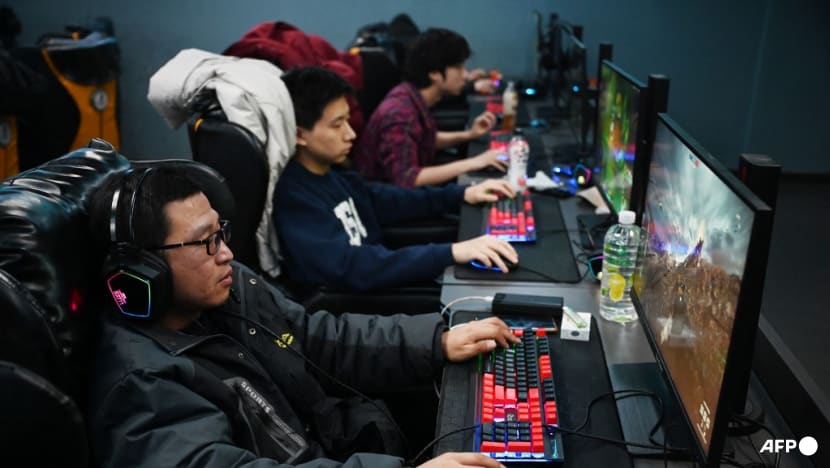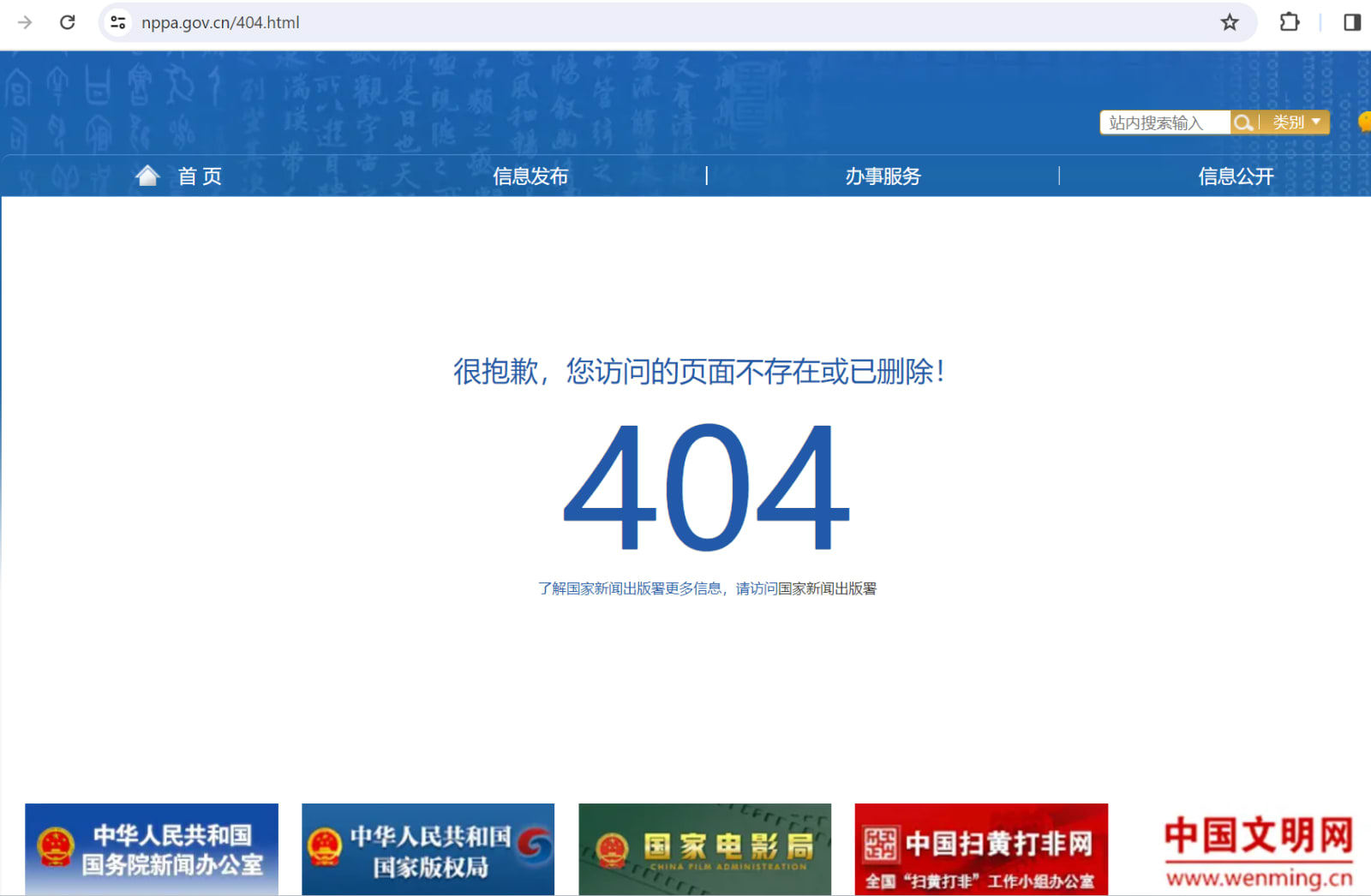China’s latest video gaming curbs had their merits. Why did authorities pull the plug, and what’s next?
China is by far the world’s largest video gaming market, with the number of gamers in the country nearly double the entire population of the US.

People play computer games at an internet cafe in Beijing, China on Jan 26, 2024. (Photo: AFP/Greg Baker)

This audio is generated by an AI tool.
SINGAPORE: It’s been a rollercoaster ride for China’s lucrative gaming industry these past two months.
From a surprise announcement of planned tighter curbs, to industry turmoil and a US$80 billion market sell-off, followed by damage control and the eventual backpedalling by the national watchdog - there has been plenty of drama.
China’s focus on growing its economy and maintaining positive market sentiment amid headwinds was a probable factor as to why regulators pulled the plug on the latest draft gaming regulations, analysts say, despite its potential merits in curbing addiction and excessive spending.
At the same time, observers expect authorities to stay the course on enacting new rules even as the timeline remains uncertain - albeit with tweaks to the fine print to shore up what were seen as vague dictates.
WHAT WERE THE PROPOSED CURBS?
Put up by China’s gaming watchdog, the National Press and Publication Administration (NPPA), last December, the draft rules essentially aimed to curb spending on video games.
They stated that online games must not offer rewards that entice people to excessive play and spend, as reported by the South China Morning Post. These include rewards for daily logins and topping up of accounts with additional funds.
All video games must also put a cap on how much players can top up their accounts and alert users about “irrational consumption behaviour”, according to the watchdog. Members of the public could provide feedback on the rules until Jan 22.
The surprise move rekindled fears that the industry was once again in Beijing’s crosshairs after a sweeping crackdown in 2021, which saw severe curbs on playtime for children and an eight-month freeze on the approval of new video games.
The result - a market meltdown as spooked investors dumped shares in major Chinese video gaming stocks. Chinese gaming titan Tencent, its closest rival NetEase and Bilibili, a social media platform popular with users, shed a combined US$80 billion in market value within a day.
Related:
The draft rules also riled Chinese netizens. Many took to China’s Twitter-like platform Weibo, leaving sarcastic remarks in the comments section of several video game news accounts.
“Regulate horror movies, regulate palace harem dramas, regulate boys’ love (dramas), regulate stand-up comedy, regulate video games,” one comment read. To which another user responded: “But they will not ‘regulate’ themselves.”
“Even if I don’t play games, I can’t afford to buy a house either…” said a user in the comments section of news channel Sina Games.
Many also responded snarkily with screen grabs of a news article published in March last year about China’s Central Financial Commission issuing a reminder that “relevant departments should actively introduce policies that are beneficial to the market”.
PULLING THE PLUG
The gaming watchdog struck a conciliatory tone amid the fallout, saying it would take public concerns into account and “amend the regulations accordingly”. A senior NPPA official was also reportedly removed.
But the draft rules were eventually taken down from the regulator’s website in January. The link to the rules were inaccessible as of Jan 23, a day after the consultation period deadline.
A check by CNA on Monday (Feb 20) showed that the website link continued to show a 404 error message.

The removal did not go unnoticed by local news platforms and Chinese netizens.
“The elders’ method of controlling the stock market,” one comment read, after a gaming blog reported on the removal of the proposed rules.
“Let’s not celebrate too soon, who knows there will be a day when another weird regulation is proposed,” another commenter in Beijing wrote.
One analyst says China’s shift towards pro-growth initiatives likely influenced the retraction of the draft rules.
“The government's recent emphasis on maintaining positive market sentiment suggests that such restrictive measures were counterproductive to their broader economic objectives,” Mr Ivan Su, a senior equity analyst at research firm Morningstar, told CNA.
China is facing economic headwinds including a property crisis, record-high youth unemployment and persistent deflation.
Against this backdrop, a hit to the lucrative Chinese gaming market - the world’s biggest - could prove hard to stomach. Domestic revenue last year surpassed 300 billion yuan (US$41.6 billion) for the first time, according to industry association CGIGC.
Meanwhile, the number of gamers in China grew 0.61 per cent to a record 668 million, close to double the entire population of the US.
When asked why the authorities followed through on a private tuition clampdown in 2021 - which also decimated the market value of listed tuition firms - while hitting the brakes on tighter gaming regulations, Mr Su pointed out the difference in scope.
He said the draft gaming rules target people of all ages. Meanwhile, the private tuition ban mainly aimed to ease the academic workload of students under the age of 16.
“This broader impact requires more consideration and could lead to more complex implications across different demographics, necessitating a more cautious approach,” he added.
REINING IN VIDEO GAME SPENDING
China is not the first country attempting to rein in spending on video games.
Various countries have taken or are taking action against loot boxes, which are virtual goodie bags that gamers can pay for to get random rewards. The monetisation technique has been likened to a form of gambling.
In Europe, Belgium imposed an outright ban on loot boxes in 2018, a world first. The Netherlands is mulling a similar move, while Spain has been pushing for a loot box ban for minors.
Despite the potential merits of China’s draft gaming rules, a key issue was the lack of clarity, analysts told CNA.
“There were no specific limits proposed in the regulation, which makes it difficult to calculate the exact impact they would have if they were implemented,” said Mr Daniel Ahmad, director of research and insights at research firm Niko Partners.
The effectiveness of China’s gaming restrictions has also been questioned.
One observer points out that while China’s curbs aim to prevent gaming addiction and excessive behaviours such as “grinding” - repeating actions or tasks in games to gain in-game experience points or rewards - some scientific journals, including European researchers from Britain and Denmark, do not think they have been effective.
The researchers did not detect any significant changes in the post-restrictions patterns in heavy play, which is defined as more than four hours daily and six days weekly, said Dr Lim Tai Wei, adjunct senior research fellow at the National University of Singapore’s East Asian Institute
“The use of fake identity log-ins utilising other adults/relatives' particulars or the relatively looser compliance tendencies of smaller game companies appear to dampen some effectiveness of the rules.”
A research report on China youth gamers by Niko Partners showed that 29 per cent of youth gamers surveyed play more than three times a week, beyond the limit set by the government. Of these, 82 per cent were doing so by using an adult ID from their parents, other family members, or friends.
While some countries such as Vietnam and Indonesia have explored additional government oversight of the games industry, Mr Daniel from Niko Partners said others have looked to move away from tighter regulations.
An example he cited was South Korea, which overturned its Youth Protection Act in August 2021. The government abolished a gaming curfew for children, which barred those aged under 16 from playing online computer games from midnight to 6am.
The “shutdown system” was introduced to encourage children to get enough sleep and protect their health. However, the effectiveness of the curfew had been questioned and there was criticism that the rule infringes on the choices of young people, along with protests from gaming companies.
STRIKING A BALANCE BETWEEN REGULATIONS AND GROWTH
Mr Su observed that the “U-turn” in regulations coincided with an increase in game licences being issued.
In December last year, China approved 105 domestic video games for sale, marking the first time more than 100 titles were approved in NPPA’s monthly list since July 2022.
Another 115 domestic titles were given the green light in January, higher than the previous month. A total of 32 imported video game titles were also cleared for sale in January.
This is also the highest number of domestic games approved in a single batch since more than two years ago, said Mr Daniel from Niko Partners, in contrast to prior sweeping regulatory changes in 2018 and 2021 when temporary freezes were implemented for game approvals.
“It’s a positive sign that China’s government is continuing to support the growth of the industry,” he added.
At the same time, analysts told CNA they expect gaming authorities to push ahead with regulations - albeit an amended version that provides more clarity.
“Regulatory authorities have no doubt heard the feedback from the broader industry and we expect them to release a new draft that takes this feedback on board and includes more specific language about the changes being implemented,” Mr Daniel said.
“China’s gaming regulator has always looked to balance the healthy growth of the industry with regulations it imposes on all media and entertainment content.”
Morningstar’s Mr Su zoomed in on specific parts of the draft rules. He expects a clause which seeks to ban video games from forcing players into combat - also known as PvP, a hallmark of many online multiplayer games - to be removed.
He also expects a rule requiring games to set a spending limit for players to be scrubbed.
Either way, the ripple effects of the episode are already being seen.
Some Chinese game developers have changed their strategies and begun looking at creating overseas games instead, Dr Lim from NUS’ East Asian Institute told CNA.
“Larger players like NetEase and Tencent went shopping and purchased gaming firms in the West (including South Korea, France, Japan and the United States) with an eye for overseas expansion as an alternative strategy for growth,” he noted.
“It remains to be seen whether the current uncertainty will prompt another wave of overseas expansion.”
















